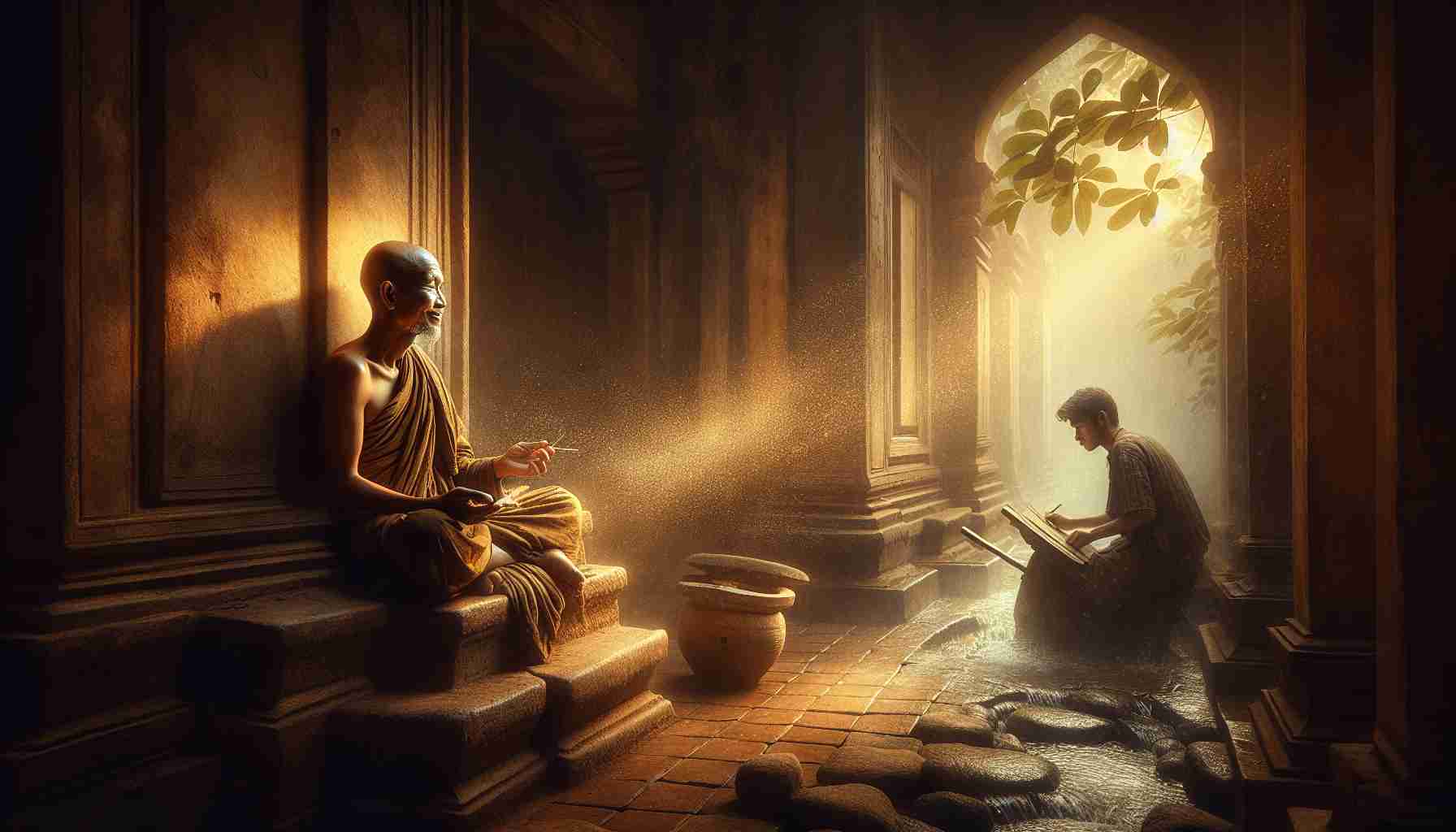

I had always believed that if I didn’t work harder than everyone else, I would fall behind. Every day since I was a little boy, I planned everything—what time to wake up, what path to take to school, even how many chews per bite so I wouldn’t waste time. My name is Shen, and I lived in the busy village of Qi, where everyone talked fast, walked fast, and dreamed big.
One afternoon, wind swept through the town plaza, swirling dust into little clouds that danced over the stone tiles. I was frustrated. My cart of scrolls had broken a wheel—for the third time that month. I kicked the cart and sat angrily on the stone bench.
That’s when I noticed a man sitting nearby. He was very still, with a soft smile on his face. His clothes were plain, covered in a little bit of that same dancing dust. For a moment, he looked like he was part of the earth itself.
He looked at me and gave a small bow. “Something troubling you?” he asked.
“I’ve done everything right,” I grumbled. “I plan, I push, I go faster than anyone, but nothing works! I feel like I’m chasing the wind.”
He nodded gently. “The wind never hurries. And yet it reaches every corner of the earth.”
I blinked. I thought he might be mocking me, but there was nothing but kindness in his eyes.
“Come,” he said, rising to his feet. “Walk with me.”
We walked down the path behind the village, where trees grew thick and tall. He didn’t speak. After a while I couldn’t help myself.
“Why don’t you say anything?” I asked. “Don’t you have advice? A plan? A secret trick?”
He chuckled softly. “Sometimes, words get in the way. Watch.”
We came to a stream. Leaves floated gently on the water. Some caught on rocks and paused, then spun free again.
“I once chased the world like you,” he said. “But then I read the words of the sage Liezi, who learned to ride the wind by letting go—not by forcing it. He didn’t fight the stream. He became like dust on the breeze.”
I looked at the leaves on the water and stayed quiet.
“You work hard,” he said. “But sometimes, doing less helps more. Nature flows. The Tao is not in pushing—it’s in allowing.”
As the sun dipped low and we walked back, my shoulders felt lighter. I thought of all the energy I had spent rushing, pushing, planning.
Since that day, I still work—but not with clenched fists. I let things unfold more. I do what I can today, then let tomorrow come as it will.
I didn’t change overnight. But now, when things go wrong, I think of the flowing dust and the man who taught me to watch the stream. I try to live like the wind—quiet, calm, and always moving forward without forcing my way.
I had always believed that if I didn’t work harder than everyone else, I would fall behind. Every day since I was a little boy, I planned everything—what time to wake up, what path to take to school, even how many chews per bite so I wouldn’t waste time. My name is Shen, and I lived in the busy village of Qi, where everyone talked fast, walked fast, and dreamed big.
One afternoon, wind swept through the town plaza, swirling dust into little clouds that danced over the stone tiles. I was frustrated. My cart of scrolls had broken a wheel—for the third time that month. I kicked the cart and sat angrily on the stone bench.
That’s when I noticed a man sitting nearby. He was very still, with a soft smile on his face. His clothes were plain, covered in a little bit of that same dancing dust. For a moment, he looked like he was part of the earth itself.
He looked at me and gave a small bow. “Something troubling you?” he asked.
“I’ve done everything right,” I grumbled. “I plan, I push, I go faster than anyone, but nothing works! I feel like I’m chasing the wind.”
He nodded gently. “The wind never hurries. And yet it reaches every corner of the earth.”
I blinked. I thought he might be mocking me, but there was nothing but kindness in his eyes.
“Come,” he said, rising to his feet. “Walk with me.”
We walked down the path behind the village, where trees grew thick and tall. He didn’t speak. After a while I couldn’t help myself.
“Why don’t you say anything?” I asked. “Don’t you have advice? A plan? A secret trick?”
He chuckled softly. “Sometimes, words get in the way. Watch.”
We came to a stream. Leaves floated gently on the water. Some caught on rocks and paused, then spun free again.
“I once chased the world like you,” he said. “But then I read the words of the sage Liezi, who learned to ride the wind by letting go—not by forcing it. He didn’t fight the stream. He became like dust on the breeze.”
I looked at the leaves on the water and stayed quiet.
“You work hard,” he said. “But sometimes, doing less helps more. Nature flows. The Tao is not in pushing—it’s in allowing.”
As the sun dipped low and we walked back, my shoulders felt lighter. I thought of all the energy I had spent rushing, pushing, planning.
Since that day, I still work—but not with clenched fists. I let things unfold more. I do what I can today, then let tomorrow come as it will.
I didn’t change overnight. But now, when things go wrong, I think of the flowing dust and the man who taught me to watch the stream. I try to live like the wind—quiet, calm, and always moving forward without forcing my way.